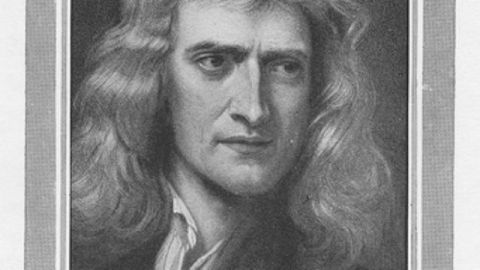Isaac Newton at the Tribeca Film Festival

Enter a rapidly changing world where a passionate scientist by the name of Isaac Newton burns political bridges in London, a royal astronomer, Edmond Halley, seeks a powerful formula from his friend Newton and spies on him for the Crown, as both men fall in love with the same brilliant researcher infiltrating the all-male scientific establishment. This is Newton’s Laws of Emotion, a hot new script written by Eugene Ramos. It applies the three-body-problem of physics—can you predict how three objects will orbit each other in a repeating pattern?—to matters of the heart.
This week, Ramos’s script won the first ever Tribeca Film Institute Sloan Filmmaker Prize, a $10,000 award, in addition to sharing a $140,000 grant with three other TFI Sloan projects honored at the 2013 Tribeca Film Festival.
Surprised that Edmond Halley may have been a spy? “When I was doing research on Halley, I was reading Carl Sagan’s Comet,” explained Ramos in an exclusive interview. “He was talking about how Halley did so much international traveling in the name of science. He surmised that he may have been a spy, because he happened to be in certain strategic places in the world that would have helped Britain in terms of intelligence. It was just a few sentences, but I thought, this is amazing. This has to be in my script.”
His producer, Andeep Singh, said, laughing. “When I would read each new draft, I would call him up and ask, ‘Did this really happen?’” She added, “We hope people are so excited about this story and that they learn more about Newton and science.”
“Isaac Newton is a remarkable figure in the scientific community and we are proud to champion a project that explores Newton’s brilliance and character,” said Tamir Muhammad, Director of Feature Programming at the Tribeca Film Institute, which partnered with the Alfred P. Sloan Foundation, when the film festival first began twelve years ago, to develop scientific feature films.
The criteria of the TFI Sloan Filmmaker Fund include a compelling story that features science and technology as the driving force, and/or a leading character who is a doctor or scientist. The stories are fictional but the science is credible.
“The mission of Sloan is to enhance public understanding of science, authentic science,” said Natalie Mooallem, Manager of Feature Programming at the Tribeca Film Institute. “We want to focus on making ideas accessible that are typically seen as inaccessible. We’re looking for the combination of enhancing the public understanding of something, and also people with fresh voices. Storytelling is how most information throughout time has been transmitted.”
In addition to Newton’s Laws of Emotion, the other screenplays selected this year by TFI Sloan include The Doctor, written by director Musa Syeed (Nicholas Bruckman, producer),the thrilling story of a young doctor from India who takes a dangerous job at an illegal clinic in New York to get back into medicine. The script is being developed by the same creative team behind the extremely low-budget and gripping Valley of Saints that won the Sloan Prize and Audience Award for World Cinema at the Sundance Film Festival last year. Another recipient is Oldest Man Alive, written by Ryan Brown and director Antonio Tibaldi, about a rich eccentric 88-year-old inventor saved from drowning by a young Romanian woman who gives him a new lease on life in this odd-couple story set to star Christopher Plummer. Then there’s 2030, written by director Nghiem-Minh Nguyen-Vo (Bao Nguyen, producer), a murder mystery in near-future Vietnam, which is flooded by global warming and reliant on genetic engineering for sustenance. Waking Hours, written by Barnett Brettler, presents the terrifying possibility of an outbreak of sporadic fatal insomnia, a protein-based disease that keeps people awake until they die of exhaustion, spreading through the Middle East and into Europe; the story is told through a a British border agent who leaves the safety of his country to search for the woman he loves, a doctor researching the disease.
TFI Sloan filmmakers develop their projects over the course of a year with film-making mentors, and scientists who advise on accuracy. In Waking Hours, Brettler stumbled upon the idea after staying up four days in a row, writing. He was advised by UCLA microbiologist Imke Schroeder on how to create a potential apocalyptic nightmare. The screenwriter and director of 2030, Nguyen-Vo, is a physicist fascinated by the potential–both good and bad–of genetic engineering, the unstable engine of the fragile world in his screenplay.
Ramos, of Newton’s Laws of Emotion, was advised by Joan Marler, a PhD in physics at Northwestern University. “There are so many people from the scientific revolution that are in [my] script,” he said. “So it is kind of like the Marvel Super heroes: you have Edmund Halley who discovered Halley’s comet; [largely forgotten prolific experimental scientist] Robert Hooke; Christiaan Huygens who has a probe named after him that landed on Titan, one of Saturn’s moons, and a really young Ben Franklin plays a big part.” The script’s love interest, Sophia, a scientist who is repeatedly told, “The world of science is a world of men,” was based on a protégé of German mathematician and philosopher Gottfried Liebniz.
At a script reading on Monday, the five compelling TFI Sloan projects were read on stage by a group of esteemed actors. Ramos’s script displayed humor, sharp dialogue, and a vibrant setting, reminiscent of the Oscar-winner Shakespeare in Love. In addition to receiving the top prize at TFI Sloan, Ramos is also in talks to participate in the 2014 Gravity Fields Festival in England, which celebrates and re-creates the life and times of Isaac Newton.
Ramos and his producing partner Singh and the other TFI Sloan 2013 participants will continue to present their projects to major film executives with the help of the program. A 2011 grantee, A Birder’s Guide to Everything, written by director Rob Meyer and Luke Matheny, with Paul Miller producing, had its world premier at this year’s Tribeca Film Festival, and starred Ben Kingsley.
This was Ramos’s third time applying to TFI Sloan. He experienced years of rejection from this and similar programs while juggling IT jobs at two different libraries, which helped him research the world of Newton.
“I spent about two years researching the script, and going on all sorts of tangents,” said Ramos. “For example, I read a lot about coffee, because coffee had just been introduced into Europe around that time. Coffee houses were where insurance companies started, where the stock market started. Even the Royal Society, much of their debate happened at the coffee house. There are a couple people [I read] who thought the introduction of caffeine into Europe is what caused the scientific revolution.”
Coffee. Imagine that. Perhaps that can be the prequel.
This Saturday afternoon at the Tribeca Film Festival, the Sloan Foundation is hosting a 20th anniversary retrospective screening of And the Band Played On, the Emmy Award-winning drama about AIDS research, which debunked myths about the disease and aired at the height of the epidemic. Afterward, a star of the film, Matthew Modine, Philadelphia screenwriter Ron Nyswaner, and science writer and How to Survive a Plague filmmaker David France will take part in a panel discussion on the impact of storytelling in the AIDs crisis. Tickets are available here and open to the public.
Image Credit: Paukrus/Flickr





